A Video Shows an Israeli Settler Shooting a Palestinian Point-Blank. 10 Months Later, No One Has Been Arrested
How generations of extremist settlers have terrorized Palestinians with impunity.
Jewish settler Yitzhak Nir does not deny shooting Zakaria al-Adra, a 28-year-old Palestinian father of four, on Oct. 13, 2023.
Nir, armed with an Israeli military-issued assault rifle, and at least one other settler left the illegal Ma’on Farm outpost in the occupied West Bank late that morning, walked 350 meters down a rugged hillside, and entered the neighboring village of At-Tuwani, according to court documents.
Al-Adra had been praying at the local mosque when he heard a commotion outside, prompting him and several others to go out and investigate.
What happened next was captured on video. Nir emerges from behind a large boulder and strides aggressively down the road toward al-Adra, striking him in the chest with the barrel of his rifle. Al-Adra raises his arm and then quickly lowers it, at which point Nir fires. Al-Adra collapses immediately, stands up, and then falls again, clutching his abdomen as blood begins to pool on the road. Screams can be heard in the background. Nir retreats slowly up the hill, his gun still trained on al-Adra.
“Everything turned very dark,” al-Adra said months later. “I felt the blood pouring out of my body, as if all of it was leaving me, and I was becoming lighter. I thought of my children, and I was sure, ‘This is the last moment of my life.’”
An Israeli military checkpoint prevented an ambulance from reaching the village, so al-Adra’s cousin drove him to the hospital while he hemorrhaged blood in the backseat. What should have been a 10-minute drive turned into a 40-minute journey due to Israeli roadblocks, al-Adra and his cousin said. He nearly bled to death before reaching the hospital, where he would spend the next 82 days.
Within a day of the shooting, the video of it went viral. A police investigation, according to court documents, named Nir as the shooter. Nir later claimed self-defense: Al-Adra, he said, intended to throw a stone. Ten months after the shooting, the police have made no arrests. Al-Adra and his family continue to live as neighbors with the man who shot him.
"I am not surprised, only ashamed," said al-Adra’s attorney, Eitan Peleg, an Israeli Jew. “This happens here every day.”
Decades Under Siege
Many At-Tuwani villagers bear the scars of beatings by violent settler mobs. The small farming community is one of 12 in Masafer Yatta, a windy region in the South Hebron Hills classified as Area C, placing it under full Israeli control. The area has been under a brutal siege for many decades: settlers and soldiers have cut off the town’s water and electricity, demolished critical infrastructure, annexed its olive groves, and harassed its sheep.
In the 1980s, Israel designated much of the area as an active military training and firing zone, with the goal of reserving the land for Jewish settlement. The Israeli government has forcibly evicted hundreds of households on the grounds that they were "illegally living in a military training area" – a move upheld by Israel’s Supreme Court in 2022 when it rejected a petition against the forced transfer of more than 1,000 Palestinians. This May, Zakaria al-Adra’s wife, Shoug, watched the military bulldoze her family home.
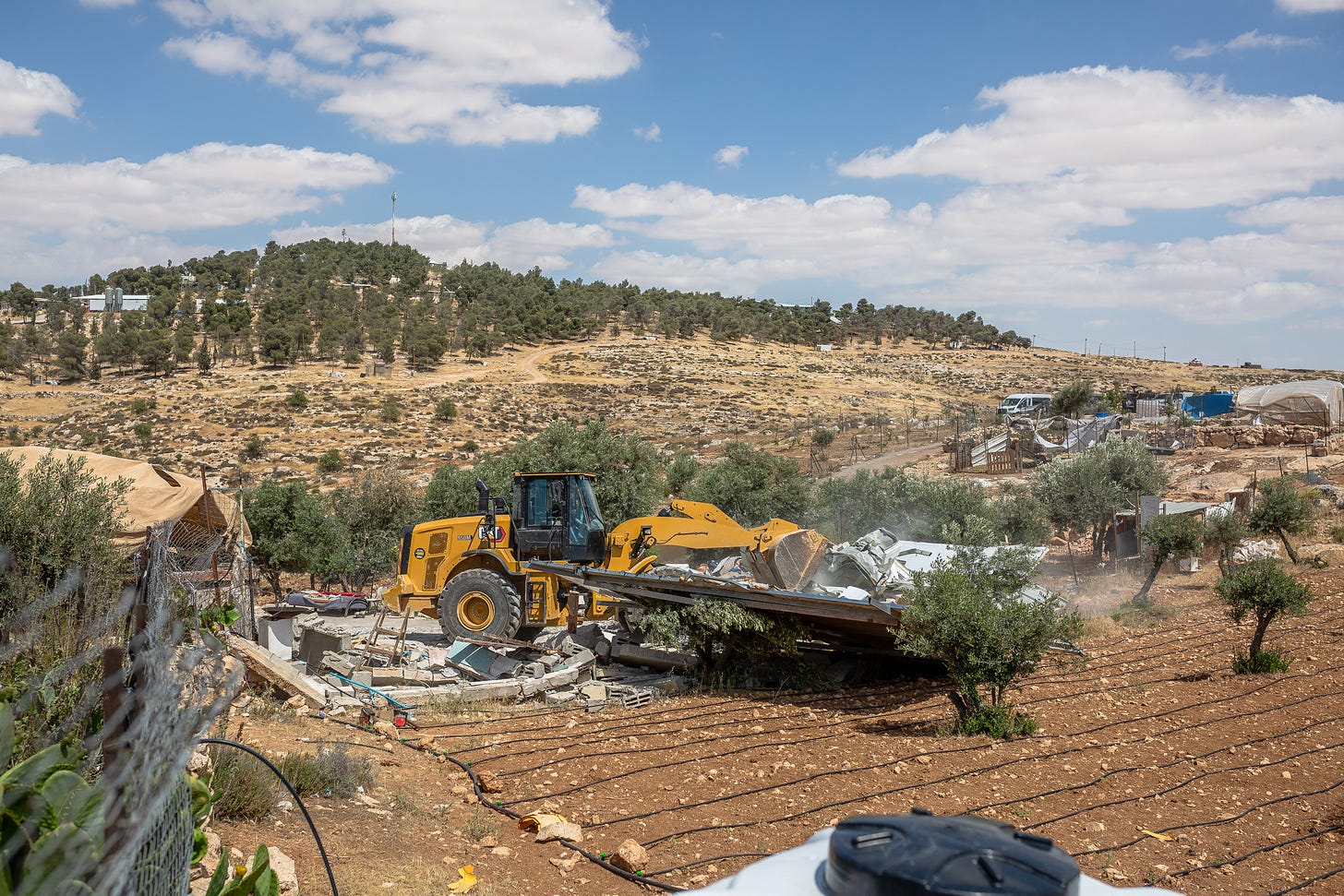
Before the Oct. 7 Hamas attack, Masafer Yatta was home to approximately 1,150 residents, though a yet unknown number of villages have been abandoned due to escalating settler violence. Israeli soldiers or settlers have killed more than 500 Palestinians across the West Bank under the cover of the war in Gaza. Dozens of armed Israeli settlers went on a rampage in the Palestinian village of Jit last week, reportedly killing a 23-year-old Palestinian man, wounding several others, and setting fire to Palestinian property. The UN has recorded more than 1,250 attacks by Israeli settlers in the West Bank since the war in Gaza began, but even before Oct. 7, the rate of violence was at an all-time high.
The escalation began after Israel’s 37th government, the most far-right coalition in the country’s history, was formed under Prime Minister Benjamin Netanyahu in late 2022. Finance Minister Bezalel Smotrich, one of numerous settlers in the current cabinet, had long been open about his desire for Israel to annex the West Bank. His broad powers over the region have increased since Oct. 7, as he has sought to bankrupt the Palestinian Authority and drive settlement expansion.
National Security Minister Itamar Ben-Gvir, in addition to arming “civilian security squads” with American assault rifles, has repeatedly led thousands of ultranationalist settlers to the Al-Aqsa Mosque compound in East Jerusalem, declaring Israel “in charge”— actions clearly intended to inflame tensions in the chronically volatile region. He has emboldened violent settlers, fighting against their arrests, referring to bands of rampaging settlers as “sweet kids,” and calling for a medal of honor for a settler who fatally shot a Palestinian teenager he accused of throwing rocks.
Against this backdrop, Yitzhak Nir shot Zakaria al-Adra nearly a year ago, etching himself into his family’s grim legacy of violence.
A Vow for Vengeance
Yitzhak Nir, 39, was raised within the most radical fringes of Israel’s far-right settler movement in the occupied West Bank.
His father and uncle, Shaul and Barak Nir, were sentenced to life in prison in 1984 for killing three and wounding 33 others in a shooting and grenade rampage at the Islamic College of Hebron. They were members of the Jewish Underground, which Israel considers a terrorist group, and accused of plotting to blow up five Palestinian buses and, later, the Dome of the Rock mosque in an attempt to incite its long-sought Holy War. Shaul Nir served seven years before then-President Chaim Herzog commuted his sentence and released him from prison, where settlers greeted him as a hero and carried him off on their shoulders. Shaul Nir and his wife were later wounded in a shooting attack in the West Bank.
Yitzhak Nir’s sister, Livnat, was married to Netanel Ozeri, a hero to many extremists in his own right. He mentored the violent “Hilltop Youth” settler group and was a prominent figure within the ultranationalist Kach movement, whose political party Israel had banned under anti-terrorism laws. The Kach party founder, Meir Kahane, had advocated for the creation of a biblically enshrined theocratic state. He used the campaign slogan, “Every Jew a .22,” and indeed, there was no shortage of guns on Hilltop 26, the illegal outpost Ozeri had established and moved his young family to in defiance of the Oslo peace process with the explicit goal of provoking a war that would end in the Palestinians’ expulsion.
Instead, on Jan. 17, 2003, two Palestinian teenagers shot him dead there, in the doorway of his family home, where he died with a gun in his hand. His funeral would become a symbol of the increasingly lawless settler movement.
The ceremony began with a series of incendiary speeches, including one by Shaul Nir, accusing Israeli police, soldiers, and politicians of being “animals” and “Nazis” and calling for settlers to take security measures into their own hands, according to media reports from the time. From there, it devolved into a violent spectacle.
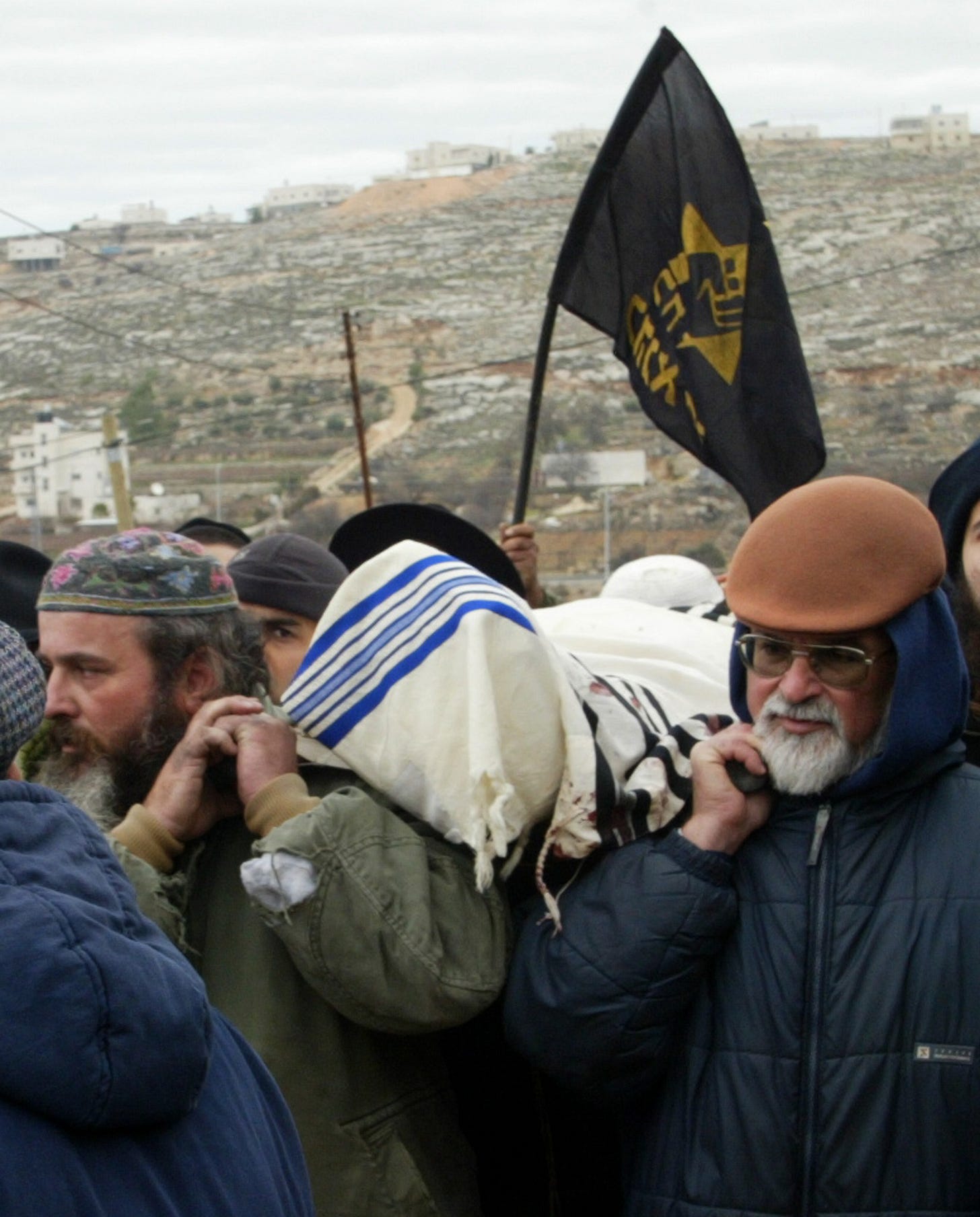
During a procession from one hilltop to another, mourners torched Palestinian cars and homes and fought with police. Despite desperate pleas from Ozeri’s elderly parents, his widow ordered her late husband’s disciples to steal his body and parade it through Jerusalem so “the entire nation could see the results of terrorism.” A tug-of-war over the body ensued, leading to a wild chase between the police and over 200 mourners through Hebron’s muddy hills and vineyards, first on foot and then by car, with the body in tow. Livnat’s original plan, blocked by Israeli officials, had been to bury her husband next to the grave of his hero, Baruch Goldstein, the Brooklyn-born Hebron settler who massacred 29 Palestinians at the Cave of the Patriarchs mosque in 1994. Years earlier, Ozeri had edited a book of fawning poems and essays about Goldstein.
Netanel Ozeri had aimed to conquer the West Bank in his lifetime. But in his death, his father-in-law Shaul Nir and those who mourned him that day made a more direct demand that would be passed from one generation to the next: vengeance.
“Rise up you mountain lion cubs and avenge Netanel creatively, with vengeance against your enemies and God will be with us.”
–Michael Ben-Horin, a settler and the self-proclaimed King of Judea, at the funeral for Netanel Ozeri
“Satisfied With Himself”
Yitzhak Nir was an infant when his father was convicted of murder and a teenager at the time of his brother-in-law’s death. Much had changed in the years leading up to his shooting of al-Adra: The extremist settlers who were once in direct conflict with the Israeli government over their illegal outposts now saw their own ranks at its highest levels. The government had retroactively classified many of their outposts as settlements, legal under Israeli law. The military had armed and outfitted them in fatigues under the direction of National Security Minister Ben-Gvir, a Hebron settler and open Goldstein-worshiper himself, blurring the line between soldiers and settlers.
Before his career in politics, Ben-Gvir was an attorney known for defending extremist Jews accused of crimes against Palestinians. In 2013, he represented Yitzhak Nir in a case where Nir and his nephew David Ozeri – Netanel and Livnat's son – were accused of stealing 14 goats from a Palestinian shepherd; the case concluded with the judge ordering the shepherd to pay 15,000 shekels (more than $4,000) to Nir for court costs.
Israeli police, according to court documents, claim to have conducted a five-month investigation into the shooting that left al-Adra hospitalized for nearly three months, during which they identified Nir as the shooter, questioned him, and revoked his weapons license. But they ultimately made no arrests, citing in court documents the lack of cooperation from the victim, even though the day after the shooting, al-Adra’s brother and father went to the police station in Hebron to file a complaint. The police told them at the time that al-Adra would need to visit the station to file a complaint himself despite his being in the hospital in critical condition, according to Peleg. The police refused their request – and later, another from Peleg – to take al-Adra’s statement at the hospital. The police also questioned the reliability of the video of the shooting, noting it was uploaded by the activist organization B’Tselem. The State Attorney’s Office then closed the case.
“The truth is, these people believe Palestinian lives are not worth living. They’re all terrorists to them.”
-Eitan Peleg, Zakaria al-Adra’s lawyer
The case, however, was reopened last month after a judge agreed to issue a restraining order against Nir, and al-Adra filed a formal complaint with police.
During the court hearing over the restraining order – the first time al-Adra or his attorney were given the name of the man who shot him – Nir testified that as a member of the Ma’on Farm outpost’s Israeli military-armed civilian security team, he was already on high alert following Oct. 7 and had received a report from the Shin Bet intelligence agency that villagers from At-Tuwani were planning an attack. He claims that they walked down to the village after hearing shouting and were confronted by “30-40 Arabs yelling and throwing stones.” He accused al-Adra of intending to throw a stone at him before he fired his weapon.
“Of course, these are all lies,” Peleg said. “The truth is, these people believe Palestinian lives are not worth living. They’re all terrorists to them. Nir was smiling throughout the whole hearing, looking very satisfied with himself – he might as well have stepped on a cockroach.”
The judge said in her decision that “bearing in mind the tense situation that prevailed” in the days after the start of the war in Gaza, “it is quite possible that the defendant acted in self-defense.” However, because Nir failed to fire a warning shot and continued carrying his Israeli military-issued weapon after having his license revoked, she granted the restraining order, banning Nir from entering At-Tuwani and carrying a weapon for 180 days. Nir’s attorney did not respond to specific questions about the case.
The following day, Peleg and al-Adra went to the police station to file a criminal complaint about the shooting nine months earlier. Police then accused al-Adra of throwing stones on the day he was shot. They questioned him and then made him pay 1,000 shekels bail (about $265) – money Peleg says his client will never get back.
If the State Attorney’s Office fails to indict Nir over the shooting, Peleg has vowed to take the case to the Supreme Court. Even then, if history is any indication, Nir will likely walk free; a study published by an Israeli watchdog group in December revealed that only 6.6% of the more than 1,600 police investigations into settler violence it reviewed from 2005 to September 2023 resulted in charges, and just 3% led to convictions.
“Everybody knows that Zakaria’s case is not unique,” Peleg said. “We hope that our efforts will make a difference.”
Israel’s Kiryat Arba police department and State Attorney’s Office did not respond to requests for comment.
“Do We Leave or Stay and Die Together?”
For al-Adra, the pain is so great that he sometimes wishes he could die.
The bullet that struck him – a "dumdum" designed to expand on impact and create a larger wound – shattered four of his ribs and tore through his internal organs. He has undergone 10 surgeries, losing half of his pancreas, his entire spleen, and 20 centimeters of his colon. He was fitted with an external colostomy bag, but the stoma, the opening in his abdomen where the bag attaches, is often infected. He has lost 60 pounds. His colon has not healed properly, but doctors believe he is too weak to go back under the knife.
“The occupation has always bothered us, but my life before was beautiful,” said al-Adra, whose family has lived in At-Tuwani since shortly after the Nakba in 1948. His grandmother, the community’s oldest resident at 85, came here with her family after escaping a Zionist paramilitary massacre in Deir Yassin, a small Palestinian village just west of Jerusalem.
“Every day, I played with my beautiful children. I plowed my father’s land with a donkey and sometimes with a tractor. I planted crops, fed my father’s sheep, and continued building my house. But everything has changed now.”
His words came out softly. He said he cannot eat or sleep as he used to. He cannot work, walk long distances, or carry his children and has suffered bouts of severe depression. Doctors told him he would have a lifelong disability.
Earlier this month, Al-Adra was admitted to the hospital again with kidney stones, which doctors believe his injuries contributed to.
“My family is my only medicine, but their tears and sorrow hurt me a lot. I always try to be strong in front of them so they think I am fine, even though I am not. I hope death will be more beautiful than my life,” he said.
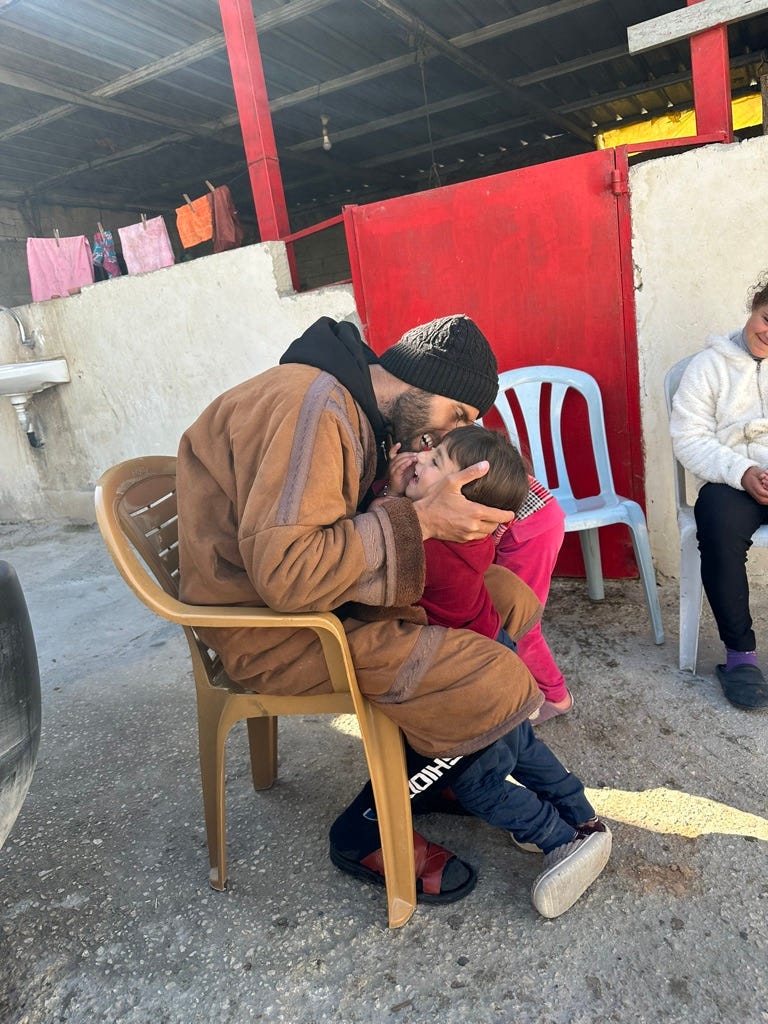
The International Court of Justice ruled last month that Israel’s presence in the West Bank, where over 700,000 Jewish settlers live among approximately 3 million Palestinians, was unlawful and should come to an immediate end. But Netanyahu rejected the ruling as “absurd,” and both Smotrich and Ben-Gvir responded by calling for further annexation of the West Bank. Today, armed settlers continue to trespass into At-Tuwani and commit acts of violence and destruction.
For decades, generations of radical settlers have descended from the hilltops to terrorize Palestinian villagers. Often, they’ve had the backing of the Israeli government and military, but when they haven’t, their messianic belief in their exclusive right to the land has driven them to even greater extremes. This was central to Yitzhak’s own father, Shaul Nir’s, justification for murdering Palestinians – that nobody, neither the Palestinians nor the hapless Israeli police, would stand in their way of taking what was rightfully theirs.
“We have faced these threats for many years, as our ancestors did before,” said Shoug, Zakaria’s wife. “But it used to be different. Some of the soldiers tried to keep us separated from the settlers. Now, we cannot even tell them apart,” she added.
“The situation is getting more and more scary. Should we run away for the sake of our children or stay and die together? We know the settlers will not rest until they expel us from our homes or kill us.”
Video courtesy of B’Tselem.



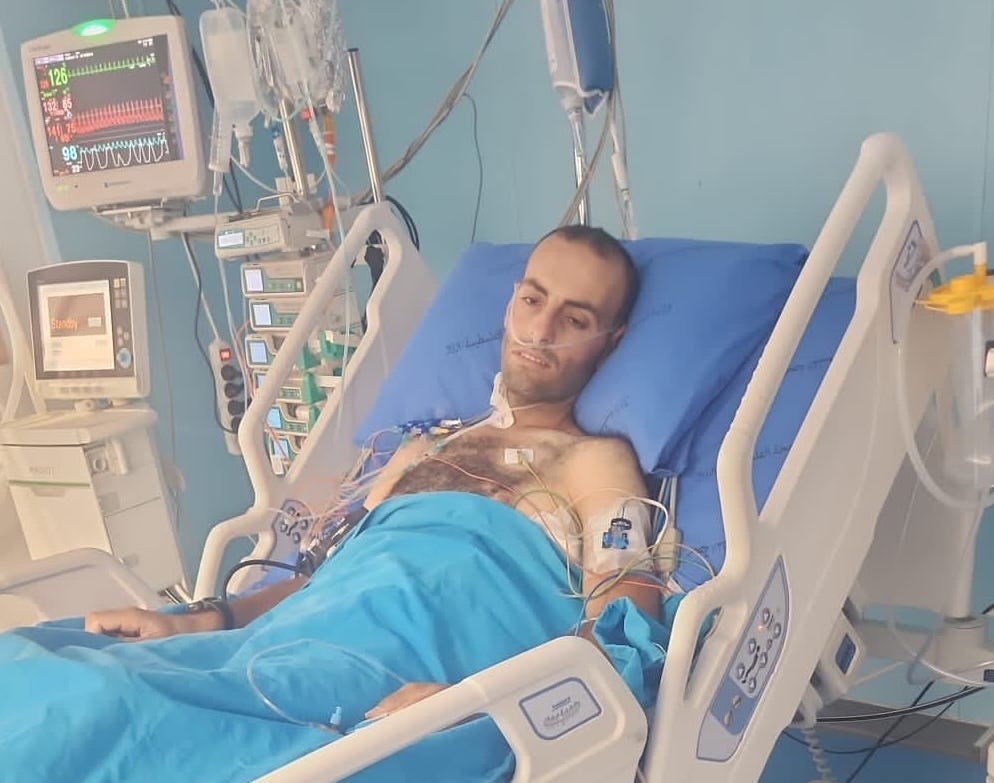
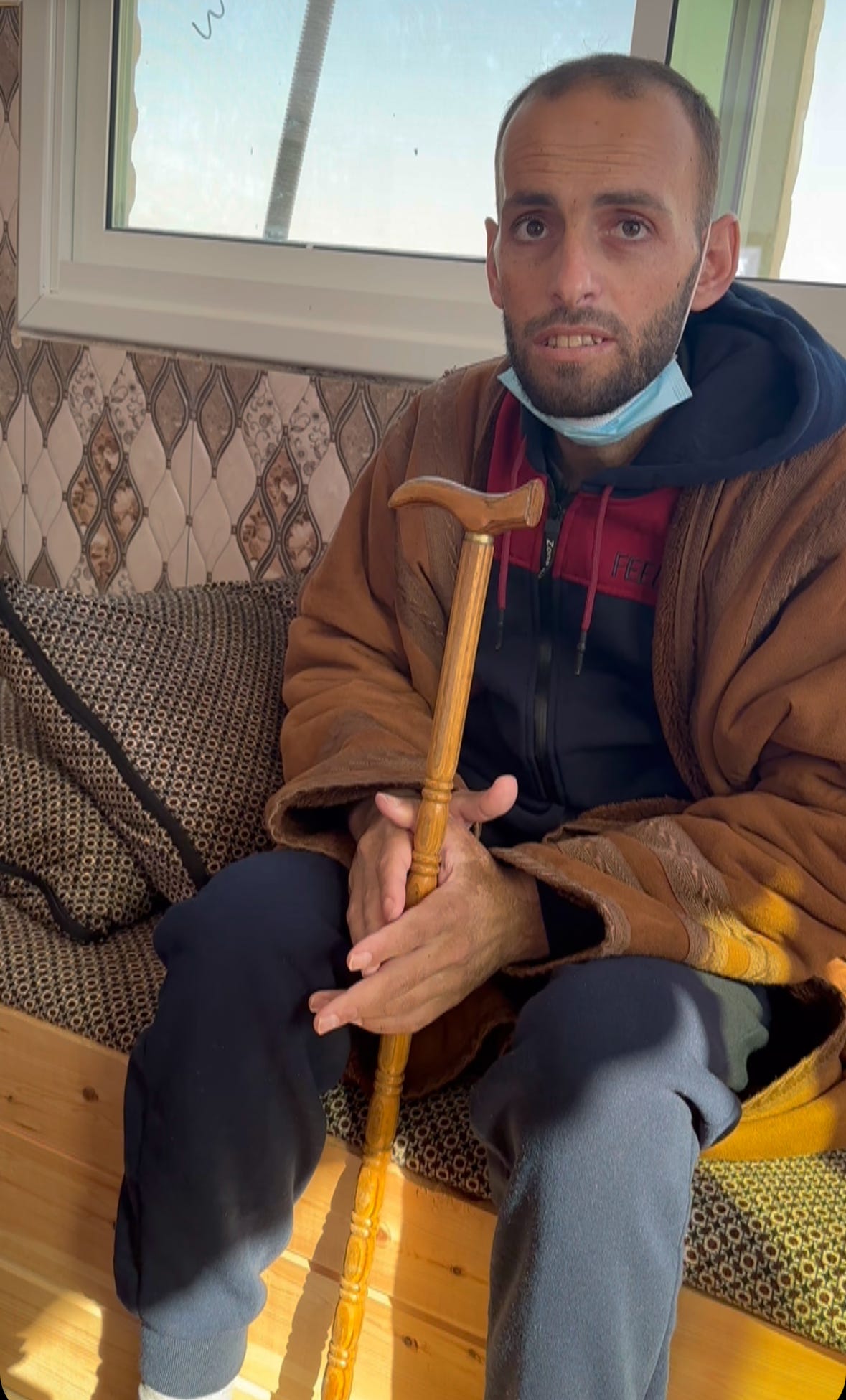


This is what Palestiniens endure every single day under settler colonialism, oppression and apartheid
Apartheid Genocidal Isreal protects its settlers who carry out violence against indigenous Palestinian civilians in order to steal their houses land and resources which is shamefull and outrageous